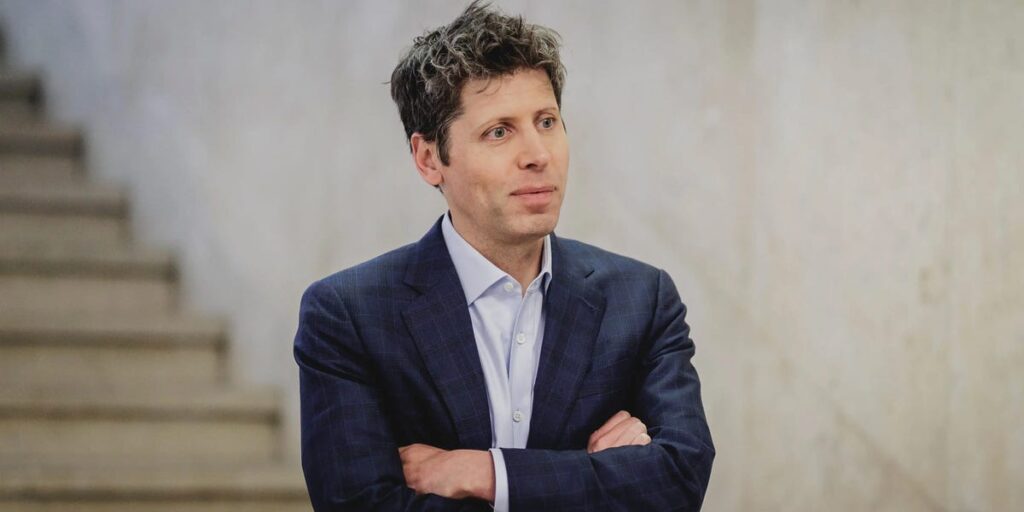Sam Altman’s breakneck pace has some tech leaders awed and others uneasy.
In the past few weeks alone, the OpenAI cofounder and CEO signed blockbuster computing deals with AMD and Nvidia, bringing his startup’s total dealmaking this year to about $1 trillion.
The company launched Sora, an AI video app that gained more than 1 million users in its first five days, as well as Instant Checkout, a shopping feature for its ChatGPT chatbot. OpenAI also unveiled new AI-powered workplace tools that its employees are using internally, signaling a potential move into the enterprise software market.
And that’s just a sampling of the San Francisco-based juggernaut’s latest announcements.
Altman “is one of the most ambitious founders out there,” said Aaron Levie, CEO of cloud-storage company Box, who likened today’s AI boom to the formative years of the internet and mobile computing. “He understands that these platform shifts come around once every decade or two decades. This is probably going to be the biggest one we’ve ever seen in tech.”
Levie and other tech leaders observing Altman from afar told Business Insider that success in entrepreneurship demands constant momentum. Yet even by startup standards, they said Altman’s torrent of activity stands out, with some calling it bold and others reckless.
“I can’t imagine moving the speed that they’re moving,” said Joel Milne, CEO of AutoUnify, a startup that makes AI-commerce applications for dealerships, marketplaces, and other vendors in the automotive industry. “It’s never been seen before.”
‘AI is a phenomenon’
Going full throttle makes sense for Altman as AI is advancing at an extraordinary clip, said Bipul Sinha, CEO and cofounder of cybersecurity firm Rubrik.
“You have to run fast to capture the opportunity,” he said. “AI is a phenomenon. It has a super exponential trajectory.”
Altman’s efforts appear to be paying off. San Francisco-based OpenAI expects to surpass $13 billion in revenue by year’s end, and its first mainstream product, three-year-old ChatGPT, has more than doubled its weekly active users in the last four months to about 800 million.
Still, OpenAI has significant expenses. The company is on track to spend $155 billion through 2029 due to the massive amount of power it needs to operate.
By timing several major OpenAI announcements close together over the past few weeks, Altman demonstrated strategic savvy, said Ross Finman, CEO of Augmodo, a startup maker of smart badges for retail workers that have 3D cameras and AI technology baked in.
“Each individually might not make a big splash, but collectively they do,” said Finman, who, like Altman, attended the Silicon Valley accelerator program Y Combinator. “It creates a network effect across multiple industries.”
Negotiation 101
Altman also deserves kudos for securing critical compute power for OpenAI for years to come with the AMD and Nvidia deals, said Art Zeile, CEO of DHI Group, the parent of job platforms Dice and ClearanceJobs.
“He is diversifying the data centers he is going to use for the future,” said Zeile. “Negotiation 101 is to have many suppliers so you can get the best price.”
Amid the frenzy, Altman played up his personal branding by inviting people to use Sora to create videos of him doing whatever they can imagine. Some followed through by making ones showing the tech founder shoplifting and rapping.
Joshua March, another Y Combinator attendee who leads the financial-services AI startup Veritus Agent, described the move as a clever way for Altman to make himself more likable.
“Most successful companies today have a strong CEO persona,” March said.
Hero or villain
Not all tech leaders are admirers of Altman. Some say they would prefer if he took his foot off the gas in the interest of consumer safety, as lawsuits allege that ChatGPT and other chatbots have harmed some users.
In August, a family sued OpenAI in California state court, alleging that ChatGPT “actively helped” their son explore suicide methods over several months before he died by suicide on April 11.
OpenAI is “moving fast and breaking things in an effort to chase a ton of revenue,” said Kate Doerksen, founder of the startup Sage Haven, a messaging app for kids that has AI components. “They’re not doing enough for safety.”
A spokesperson for OpenAI noted that the company last month rolled out parental controls to help keep teens safe and a parent resource page.
“Our work to make ChatGPT more helpful and strengthen its safeguards is constant and ongoing,” she said. “We’ll keep improving safety as we build and scale the infrastructure needed for the future.”
Jill Popelka, CEO of AI cybersecurity company Darktrace, sees Altman as a leader who’s stuck in a unique bind. She said that slowing down could enable his rivals to catch up to OpenAI, but moving too quickly could result in mistakes or oversights.
“I can’t really imagine what it’s like to be in his shoes,” Popelka said, “to be the hero or the villain of this technology that everyone is talking about.”
Read the full article here



